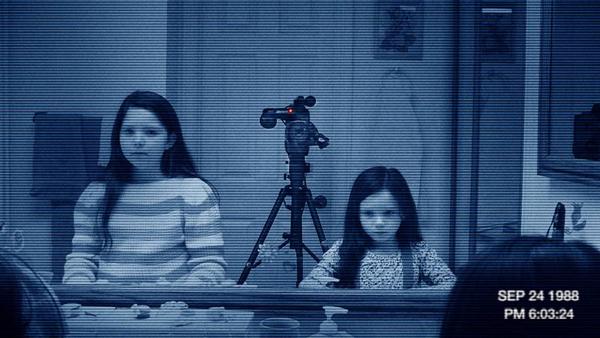Why Ghosts Get 'Spooked' by HD Cameras

"Paranormal Activity 3," the latest in a series of successful low-budget horror films about amateur ghost hunters, opens on Friday (Oct. 21). The first film, released in 2007, was a surprise indie hit around the world.
The films are shot in a "found footage" style, in which the audience is treated to footage supposedly taken in real life from home videos and security cameras. This technique, often involving handheld cameras and actors talking to the camera operator, has been around for years but was widely popularized in the 1999 film "The Blair Witch Project."
The grainy, low-budget look of the films is no accident; it was done partly because the films actually are low-budget, and partly for added "realism." The fact that the low-quality picture skips and jitters adds to the suspense, and Horror Filmmaking 101 teaches that a dark, partly obscured monster is much scarier than one that's seen clearly in bright light.
It's been an effective technique in the first two films, scaring up hundreds of millions of dollars at the box office. And it's also true in real-life ghost hunting: Virtually all of the "evidence" for ghosts appears in the form of brief, ambiguous anomalies recorded with low-quality cameras (or good-quality cameras sabotaged by low-light conditions).
People have long reported weird, ghostly and paranormal activity, but perhaps the biggest mystery is why the evidence especially the photographic evidence hasn't improved. Are ghosts afraid of high-definition cameras?
The idea that amateur ghost hunters wandering in the dark with crummy video cameras are going to uncover genuine evidence of a spirit realm unknown to science seems absurd. Nonetheless, the SyFy show "Ghost Hunters" has been wildly popular for years it was recently picked up for an eighth season despite the fact that the team has never found scientific evidence for ghosts. The show is, of course, entertainment television instead of real investigation, but what about the hundreds of amateur ghost-hunting groups around the world inspired by the show?
If ghosts exist, you would expect the photographic and video evidence for them should improve dramatically as more and more people look for them with better and better equipment. There are more people actively trying to document paranormal activity than ever. And, thanks to smartphones, at no time in history have so many people had high-quality cameras on hand virtually all the time. Today there's no excuse for anyone to capture grainy photos or video images of anything, whether it's your aunt in a horrid floral hat, Bigfoot in the woods , or paranormal activity in your hallway. And yet that is so often the quality of the footage that makes the rounds on the internet. [Mythical Creatures: Beasts That Don't Really Exist (or Do They? )]
Sign up for the Live Science daily newsletter now
Get the world’s most fascinating discoveries delivered straight to your inbox.
This past weekend, Apple sold 4 million iPhone 4S units, each of them equipped with a built-in high definition 1080p camera featuring state-of-the-art optics, image stabilization, automatic lighting adjustment and other features that rival cameras used by Hollywood videographers only a few years ago. Perhaps one of those iPhone users will finally record some clear evidence of ghosts.
High definition provides more image information, which helps identify things often mistaken for ghosts, such as random shadows, unnoticed reflections and video artifacts. With those ghost impostors more easily dismissed, any real ghostly images should be sharper and clearer than ever before. The age of amateurs posting questionable video evidence of the paranormal should be coming to an end. Professional ghost hunters, however, might well continue using cameras that produce low-quality images. After all, that's where the ghosts appear.
- Blurry Bigfoot and Fuzzy Ghosts: 6 Paranormal Videos Debunked
- The Most Amazing Optical Illusions (and How They Work )
- Russia Claims 'Indisputable Proof' of Yeti
Follow Life's Little Mysteries on Twitter @llmysteries, then join us on Facebook.










